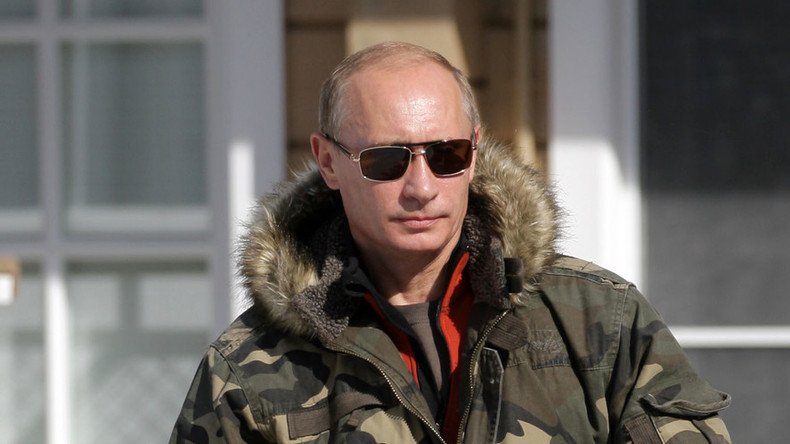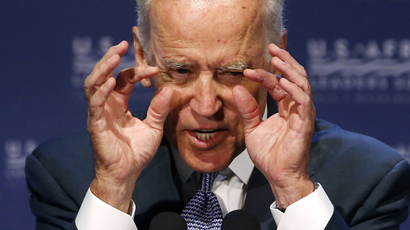German Secret Service copies CIA playbook: blame Putin!

The German government has asked its intelligence agencies to investigate whether Russia is conducting a propaganda campaign in Germany. This is the latest gambit in an ongoing campaign to present Putin as Europe's bogeyman.
As reports have been vague at best and Berlin will “neither confirm nor deny” their provenance, what exactly they hope to discover is unknown. Has German intelligence invented a litmus test for how dissenting a viewpoint has to be to be classified as “propaganda,” or will they make it up as they go along?
Deutsche Welle, Berlin’s (publicly-funded, just-like-RT, to-carry-German-POV-but-would-never-be-called-propaganda-by-western-media) foreign news broadcaster maintains that German government experts worry that Moscow has prepared “a systematic propaganda push reminiscent of Cold War KGB methods.” The irony here is that RT was set up as a news service, for the precise reason that Russia learned full well, from its Soviet past, that propaganda was not the way to make its voice heard.
Who wants to sit down and watch, thrilling though they may be, reports on the grain harvest in Stavropol? Or a polemic on friendship between Moscow and Cuba? Unless, perhaps, it featured The Buena Vista Social Club.
And yet, it doesn’t stop the German security services from sounding an alarm about, seemingly, the simple fact that Russian foreign broadcasting exists. Because, you see, by its own media’s admission, things aren’t going super-well in Germany and in Europe in general as of late, and the culprit couldn’t be more obvious: Russia.
It wouldn’t be all that surprising if, decades from now, state papers show that “blame everything on Vladimir Putin” was actually official policy at this time. Russia appears to be the fall guy for all modern Western difficulties. The only saving grace is that at least they are consistent, in that they never point the finger elsewhere. Especially at themselves.
So, what has Russia done now?
Most recently the German media has been accusing Moscow of trying to destroy the European Union using Syrian refugees. Yes, that’s right. Apparently Russia is “weaponizing migration” to destabilize the institution. This is despite the fact that over a million migrants arrived in Europe last summer before Russia intervened in Syria. In fact, Russia was a late arrival to the Middle Eastern quagmire. Moscow interceded there only last autumn, at the request of the Damascus government. On the other hand, America and quite a few of its NATO friends have been actively meddling in the region since 2003.
In 2015, Schengen creaked and governments across Europe began to resist Berlin’s entreaties to accept migrants. Sure, Hungary and Slovakia, who were prominent in resisting Merkel’s pleas, have reasonably good relations with Moscow. But only the most deluded Eurocrat could postulate that Britain, Poland and Latvia, all rabidly hostile to the Kremlin, were in anyway influenced by Putin in their refusal to play ball.
Lest you forget, Russia is also accused of using “hybrid war” against Germany. By reporting on actual things that actually happen. This is supposed to be part of a grand strategy to destroy the EU. Because, naturally, every single bad thing that happens anywhere from Lisbon to Athens is caused by Russian meddling.
The real problem is within
In reality, London Mayor Boris Johnson and British Prime Minister David Cameron are doing more to damage the EU right now than Putin could ever manage. Moscow has had no influence on the Union’s second most powerful member deciding to hold a referendum on continued membership – a move that could do more damage to Europe’s unity than arguably any other challenge facing the continent. Unless some fantasists in the pro-Brussels camp believe that Johnson and Cameron take orders from the Kremlin? Of course, this hasn’t stopped pro-EU lobbyists from raising the specter of Putin in their drive for continued British membership.
Furthermore, they accuse Moscow of “negative propaganda” against the EU. But here’s the reality: the British press has lambasted Brussels for decades. British right-wing newspapers make such ludicrous claims about Europe that Moscow outlets can only watch in amazement. Rupert Murdoch, owner of the Sun & the Times, has been pressuring UK governments to withdraw from the EU for four decades, as former Prime Minister John Major admitted.
Testifying at the Leveson Inquiry in London, Major revealed that just before the 1997 general election, Murdoch “made it clear that he disliked my European policies, which he wished me to change.” Major continued: “If not, his papers could not and would not support the Conservative government. So far as I recall he made no mention of editorial independence, but referred to all his papers as ‘we’.”
While Brexit and the migrant crisis are current live dangers for Brussels, economic challenges are looming as well. True, things mightn't be all rosy in Russia either at the moment, but Western pundits have made sure you know that “Russia is totally about to collapse, we promise!” They somehow fail to notice that with inflation stuck below one percent, EU powerhouses such as Italy and France are scrabbling for growth that isn’t materializing, while the damaged economies of Portugal and Greece show no signs of recovery. Paul Krugman, a Nobel laureate, calls this“secular stagnation.” Krugman is not Russian, by the way, and has never worked for the Russian media.
Calling The Shots
Another frequent accusation lobbed at Russia is that it’s trying to drive a wedge in the EU by daring to hold dialogues of sorts with individual countries. It’s hardly shocking that Moscow mightn’t have full confidence in the autonomous decision-making powers of an organization (EU) of which the US Vice-President Joe Biden has admitted ordering around. “[Europe] did not want to do that,” (impose sanctions on Russia) until America “embarrassed” them into acquiescence, he proudly stated in October 2014. And so, time and time again, instead of dealing with their own problems, certain players in Berlin and Brussels prefer to misrepresent them as nefarious Russian plots.
Thus, we have Stratcom East, which receives millions of euros from the EU funding to publish a spreadsheet largely compiled by “tip-offs” from social media activists who rarely if ever provide factual rebuttals of RT reports. Instead, they simply document their displeasure at the viewpoints expressed. Oh, pluralism! RT, by the way, has a section (Facts vs. Fiction) to counteract blatant disinformation about the channel, launched at least half a year before the European project. Maybe we can take StratCom East as the sincerest form of flattery. If not in facts, then at least in format?
German media’s current fixation on the aforementioned ‘hybrid warfare’ is also instructive. The term is a NATO slogan, designed to stoke up fears and justify the military organization’s continued existence. Of course, NATO is primarily a tool of US foreign policy. Rapprochement between Berlin and Moscow just might be Washington’s worst nightmare. Hence, what better way to protect American interests in Germany than to demonize Russia and drive a wedge between the two countries?
It’s also interesting that German press reports mirror US talking points of the past few years. In the past, the BND (German Secret Service in charge of the “Russian propaganda investigation”) has been infiltrated by CIA spies, at low levels. Additionally, the top brass of the CIA and BND frequently cooperate. Then there’s the revelations of Udo Ulfkotte, a former editor at Frankfurter Allgemeine Zeitung, who alleges that the CIA and BND bribe journalists in Germany to write pro-NATO propaganda articles. And the US defense establishment has long been treating Russia as the top geopolitical adversary, and President Putin as public enemy #1.
Lord Ismay, the first secretary-general of NATO, famously said that the Alliance existed to “keep the Americans in, the Russians out, and the German’s down.” All signs point to the fact that current NATO policy is focused on continuing that goal. Can we assume that the German establishment blames Putin for that as well?
The statements, views and opinions expressed in this column are solely those of the author and do not necessarily represent those of RT.
















